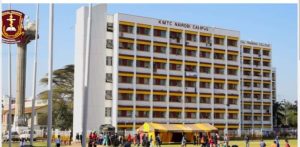
Have always received this query in my inbox. ‘Could you briefly describe KMTC Programmes?’ I have sampled a complete description of all the KMTC Programmes and Courses, in this article.
1. Clinical Medicine and Surgery
Clinical Officers perform general and specialized medical duties such as bdiagnosis and treatment of disease and injury, ordering and interpreting medical tests as well as performing routine medical and surgical procedures.
2. Dental Technology
Dental Technology is a specialty in the field of dentistry that deals with the treatment and rehabilitation of the tissues of the oral cavity and the face. It encompasses the design and fabrication of various prostheses and corrective appliances such as dentures, braces and crowns and bridges.
3. Health Promotion and Community Health
Students are trained to promote health and prevent diseases by educating and creating public awareness on disease prevention measures. A Health Promotion Practitioner makes intervention using three categories of strategic interventions: knowledge and skills development, mitigation of competing interests, and advocating for good health
4. Health Records & Information Technology
The programme entails the management of patients’ health records; both manually and electronically (Electronic Medical Records), electronic health information, health data classification and management, research, community diagnosis, emergency medicine, application of ICT in health care, monitoring and evaluation, pathology, anatomy and physiology.
5. Medical Education
The programme entails preparing adult learners for teaching research, mentorship, development of health learning/teaching materials, assessment of learning outcomes and development, review and evaluation of curricula in health training institutions.
6. Medical Engineering
The Medical Engineering profession deals with design, manufacture, installation and maintenance of medical and hospital equipment.
7. Medical Laboratory Sciences
Medical Laboratory Technicians perform chemical, hematological, immunologic, histopathological, cytopathological, microscopic and bacteriological diagnostic analyses
on body fluids such as blood, urine, sputum, stool, cerebrospinal fluid as well as other specimen. This cadre works in Clinical Laboratories at Hospitals, biotechnology labs
and non-clinical industrial clinics.
8. Nutrition and Dietetics
Community Nutritionists play a pivotal role in educating members of the community on ideal nutrition, diet and food selection. In addition, this cadre educates the community on ways to develop healthy eating habits that fulfill their dietetic requirements and ways to manage diseases through nutrition.
9. Nursing
Nurses work in Hospitals and other health facilities, where they provide hands on care to patients by administering medications, managing intravenous lines, observing and monitoring patients’ conditions, maintaining records and communicating with Doctors.
10. Occupational Therapy
Occupation therapists trains its students to identify occupational performance
deficits and their causes with an aim to treating injured or disabled patients through
the therapeutic use of everyday activities.
11. Optometry
Optometrists perform vision tests and analyze results, diagnose sight problems
such as near sightedness or farsightedness, and eye diseases such as glaucoma. They
prescribe eyeglasses, contact lenses and other visual aids.
12. Orthopaedic Technology
Orthopaedic Technologists assess, design and fabricate as well as fit orthopedic
appliances used to support, align, prevent or correct deformities of a body part and
improve the function of a movable body part. These appliances include Prosthetics
and Orthotics
13. Pharmacy
Pharmacy Technicians are mandated with receiving, confirming and filing
prescriptions, counselling patients on rational use of medicines, managing inventory in
the entire drug supply chain, extemporaneous preparation of products, pharmaceutical
sales and marketing detailing consultants, chemical analysis in the pharmaceutical
industry and regulatory affairs in pharmaceutical companies.
14. Public Health
Public Health Officers identify and investigate health issues and health hazards.
They monitor health status to identify community health problems, enforce laws and
regulations that protect health and ensure safety, evaluate effectiveness, accessibility
and quality of personal and population based health services.
15. Orthopedic and Trauma Medicine
These cadres are trained to treat injuries related to bones and soft tissue by
applying non-operative approaches.
16. Radiography and Imaging
Medical Imaging Technicians are responsible for gathering images through
X-rays, ultrasounds and other equipment used to diagnose or more closely
examine medical issues, concerns or conditions.
17. Community Oral Health
Community Oral Health practitioners undertake promotive, preventive,
curative and rehabilitative oral health activities within the communities.
18. Physiotherapy
Physiotherapy is a comprehensive approach to the prevention, diagnosis
and therapeutic management of pain and disorders of human movement. The
discipline is concerned with helping people restore mobility and wellness after an
injury, accident or disability.
You may also like:
- Kenya Medical Training College (KMTC) 2021/2022 courses, requirements, online application and fees
- Latest KMTC official contacts for all campuses; Phone numbers, Emails and Postal Addresses
- Latest Kenya Medical Training College, KMTC; Courses list, requirements, study duration, how to apply, Contacts and Fees; Ultimate guide
- KMTC Fees Structure for all courses, programmes and how to pay
Important KMTC Links
-
KMTC Courses 2024 (Entry requirements, How to apply, fees and Intakes)
-
KMTC courses, requirements and how to apply online
-
KMTC Student Portal at https://portal.kmtc.ac.ke/login/sign-in
-
KMTC campuses official contacts; List of all campuses, Phone Numbers, Postal Addresses, Emails and Principals
-
Complete information about the Higher Education Loans Board, Helb; Loan applications and repayments
-
Helb takes over the Afya Elimu Fund [AEF]- Helb latest news
-
HELB Afya Elimu second and subsequent loan application; Second and subsequent
-
Helb- This is all you need to know concerning helb loans; application, processing, disbursement, repayment and clearance
-
Diploma in Orthopaedic Technology at KMTC (Requirements, How to apply and Intakes)
-
KMTC issues guidelines for reporting of newly admitted students and continuation of learning
-
Complete guide to Kenya Medical Training College, KMTC; Fees, Campuses, Courses, application requirements and procedure plus a list of all required documents
-
Diploma in Kenya Registered Nurse/Mid- wifery at KMTC (Requirements, How to apply and Intakes)
-
Diploma in Medical Laboratory Sciences at KMTC (Requirements, How to apply and Admissions)
-
Diploma in Health Promotion at KMTC (Requirements, How to apply and Intakes)
-
Certificate in Health Records and Information Technology at KMTC (Requirements, How to apply and Intakes)
-
KMTC PORTAL ONLINE- APPLY, LOGIN, REGISTER
-
Diploma in Physiotherapy at KMTC (Requirements, How to apply and Intakes)
-
Diploma in Clinical Medicine at KMTC (Requirements, How to apply and Intakes)
-
Diploma in Orthopaedic and Trauma Medicine at KMTC (Requirements, How to apply and Admissions)
-
KMTC Student Portal at https://portal.kmtc.ac.ke/login/sign-in
-
Diploma in Radiography and Imaging at KMTC (Requirements, How to apply and Intakes)
-
Diploma in Dental Technology at KMTC (Requirements, How to apply and Intakes)
-
Certificate in Public Health at KMTC (Requirements, How to apply and Intakes)
-
Certificate in Orthopaedic and Trauma Medicine at KMTC (Requirements, How to apply and Intakes)
-
Diploma in Nutrition & Dietetics at KMTC (Requirements, How to apply and Intakes)
-
KMTC fees structure for government and self sponsored students
-
Medical Training College students set to get more money from Helb
-
KMTC Fees Structure for all courses, programmes and how to pay 2024
-
How to Apply for KMTC Courses (KMTC online application portal)
-
Diploma in Pharmacy at KMTC (Requirements, How to apply and Intakes)
-
Latest KMTC Courses list, requirements, study duration, how to apply, Contacts and Fees; Ultimate guide
-
Certificate in Community Health Assistant at KMTC (Requirements, How to apply and Intakes)
-
Certificate in Nutrition & Dietetics at KMTC (Requirements, How to apply and Intakes)
-
Diploma in Medical Engineering Technology at KMTC (Requirements, How to apply and Intakes)
-
Certificate in Enrolled Community Health Nursing at KMTC (Requirements, How to apply and Intakes)
-
Diploma in Optometry at KMTC (Requirements, How to apply and Intakes)
-
Certificate in Medical Engineering Technology at KMTC (Requirements, How to apply and Intakes)
-
Diploma in Health Records and Information Technology at KMTC (Requirements, How to apply and Intakes)
-
Diploma in Public Health at KMTC (Requirements, How to apply and Intakes)
-
KMTC campuses official contacts; List of all campuses, Phone Numbers, Postal Addresses, Emails and Principals
-
Diploma in Occupational Therapy at KMTC (Requirements, How to apply and Intakes)




